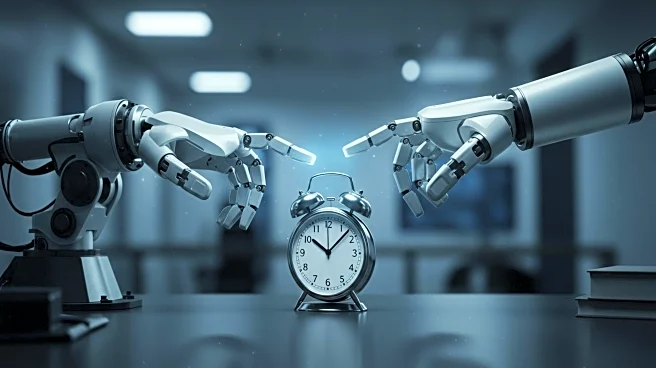What is the story about?
What's Happening?
Recent academic research suggests that technology, particularly artificial intelligence and robotics, may be accelerating job destruction in the U.S. Historically, technological advancements have led to the creation of new industries and jobs, but current trends indicate a shift. Economist David Autor from MIT highlights that since 1980, automation has replaced more jobs than it has created, particularly affecting professional, technical, and managerial occupations. This shift is attributed to the increasing intelligence of machines, which are now capable of performing tasks that were previously reserved for humans. The implications of this trend could be significant, affecting inflation, government size, and international relations, particularly between the U.S. and China.
Why It's Important?
The potential for AI to be a net job destroyer carries significant economic implications. High unemployment rates could lead to deflation, as cheaper and more capable machines reduce demand for human labor. This scenario might compel the U.S. government to expand its role in facilitating income and wealth transfers from technology owners to displaced workers. Additionally, the ability to create and utilize technology will likely determine economic winners and losers, positioning the U.S. and China as dominant players due to their strong industrial policies. The ongoing tech war between these nations could have far-reaching consequences, surpassing the impact of traditional trade disputes.
What's Next?
If AI continues to replace human jobs, the U.S. government may need to implement policies to address mass unemployment and economic inequality. This could involve increased social welfare programs or retraining initiatives to help workers transition to new roles. The tech war between the U.S. and China is expected to intensify, with both countries striving to maintain their technological edge. Investors and policymakers will need to monitor these developments closely, as they could reshape global economic dynamics and influence future industrial strategies.
Beyond the Headlines
The ethical and cultural implications of widespread automation are profound. As machines become more intelligent, questions about the value of human creativity and imagination arise. Additionally, the societal impact of mass unemployment could lead to shifts in cultural norms and values, as people adapt to new economic realities. The aging population in developed markets may also influence the adoption of automation, potentially offsetting labor force shrinkage. However, the rapid pace of technological evolution suggests that betting on technology over human labor may become increasingly common.


















